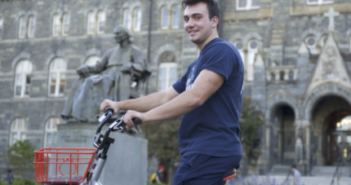Shanghai Bike Share Hits Washington Streets
 Mobike expanded its market to the United States on September 22 with a pilot program in Washington, D.C.. Originally founded in Shanghai, China, Mobike began its D.C. program with 200 bikes but plans to extend its service network across the United States, according to Sherisse Pham of CNN.
Mobike expanded its market to the United States on September 22 with a pilot program in Washington, D.C.. Originally founded in Shanghai, China, Mobike began its D.C. program with 200 bikes but plans to extend its service network across the United States, according to Sherisse Pham of CNN.
Unlike current D.C. transportation company Capital Bikeshare, Mobike is a fully station-less system, which eliminates the need to hunt for a bike dock. Georgetown students will benefit from this convenient system, given the constant scarcity of bikes available in the neighborhood immediately around campus.
As a station-less system, Mobike uses an application available on both iOS and Android to pinpoint all the bikes near the user on a map. To hire a bike, a user simply needs to press the unlock button and scan the QR code located on the bike. To park, a user only needs to rotate the lock on the rear wheel and receive a fee through the app. As for price, Mobike charges $1 for every 30 minutes—exactly half that of Capital Bikeshare.
The arrival of Mobike has generated mixed responses from Georgetown students. Amber Liao (SFS ‘21), originally from Xi’an, China, said, “I saw a Mobike parked outside Car Barn the other day. It made me feel like home. I am very excited for the expansion of its service network, and I hope to see a growth in bike-sharing culture in the United States.”
Rohan Dalvi (SFS ‘21), who visited the Mobike headquarters in Beijing this summer, offered a different perspective, saying, “I think [the arrival of Mobike] represents an important moment because Mobike is one of the first examples of authentic Chinese innovation reaching the American market. Given the urban challenges the service has raised in many Chinese cities, I am excited to see how the technology adapts to the more regulated American business landscape.”
Mobike, together with its main competitor, Ofo, has placed over 200,000 bicycles in metropolitan areas like Beijing and Shanghai. In these locations, local government has set-up little regulation regarding parking and riding on roads without bicycle lanes. Mobike has struggled to effectively punish users who violate the rules by parking illegally or disassembling the bikes. As a result, hundreds and thousands of yellow and orange bikes clog the main streets and sidewalks in Chinese cities.
While 200 Mobikes in D.C. may not pose a huge challenge for the municipal government, concerns of the negative impact on transportation remain. In fact, to address the potential chaos before it occurs, Steve Dent, writing for technology blog Engadget, predicted that “Mobike will mobilize a D.C. team to track and move them around or re-park them neatly if need be.”
With the new bike-sharing system, D.C. may see growth in its already popular pedaling culture, and Georgetown students may finally find a cheap and convenient way to explore different parts of D.C. on weekends.
